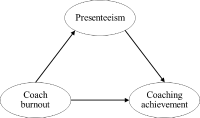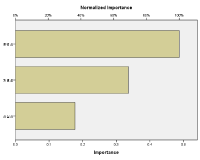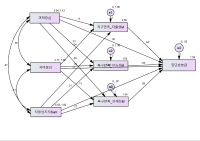PURPOSE This study aimed to provide evidence for improving the working environment by exploring the phenomenon of presenteeism experienced by coaches. METHODS Ten coaches experiencing presenteeism were selected as participants of the study using the snowball sampling method, and in-depth interviews were conducted. The in-depth interviews were conducted for about 50 to 60 min using semi-structured questions organized through pre-expert meetings, and inductive content analysis was conducted. RESULTS First, the health problems that developed while coaching were categorized into two detailed areas (physical and psychological symptoms). Second, the causes of presenteeism were categorized into four general areas (policy and institutional problems, poor job environment, athlete problems, and human relations). Third, performance loss due to presenteeism was categorized into two general areas (coach-athlete relationship damage and poor training performance). Finally, coping with presenteeism was categorized into three detailed areas (private time spending, joining acquaintances, and changing training methods). CONCLUSIONS The result of this study confirmed that coaches are currently experiencing the phenomenon of presenteeism for various reasons, and the symptoms and coping method for this differ with each individual. However, the phenomenon of presenteeism experienced by coaches requires further future research since it is not easily observed and the coping method is not efficient.
PURPOSE This study aims to develop a coach presenteeism scale with scientifically proven reliability and validity. METHODS In order to achieve the research purpose, preliminary questions were drafted using previous studies (Lee & Kim, 2022) and existing presentation questionnaires (SPS-34, SPS-6, SPS-13). The preliminary set of questions was composed of 23 questions, which were deliberated through a meeting with subject experts. After which, a survey involving 183 coaches was conducted. In this study, statistical verification procedures were conducted through construct validation, exploratory factor analysis, confirmatory factor analysis, internal consistency analysis, convergent validation and discriminant validation. RESULTS Finally, a 2-factor (DRA 5 items, DTP 5 items), 10-item coach presenteeism scale was developed. CONCLUSIONS In this study, a scale with verified reliability and validity was developed to support and investigate the presenteeism phenomenon experienced by coaches. These may be used by coaches themselves to check their presenteeism status and may guide future research to effectively train athletes.

Purpose The purpose of this study was to examine the relationship among burnout, presenteeism, and coaching achievement perceived by athlete coaches in the sport field, and to identify the mediating effect of the presenteeism on the relationship between burnout and coaching achievement. Methods For this purpose, data were collected from 151 athlete coaches in South Korea through the survey. Measurement tools consisted of questionnaires on the coach’ burnout and presenteeism (SPS-13) that were designed in line with the research purpose. Collected data were analyzed using reliability testing, descriptive statistics, correlation analysis and simple mediation effect test. Results First, burnout level perceived by coaches was positively related to presenteeism, and not associated with coaching achievement. And presenteeism negatively correlated with coaching achievement. Second, the burnout level of the coach was negatively related to the coaching achievement through the presenteeism, the mediating variable. Conclusions Burnout of the athletes' coaches in the sports field has been confirmed to decrease the coaching achievement by increasing the presentations which is the work impairment due to their health problems.


Purpose This study was to examine the effect of athletes’ personality on coach-athlete maintenance of relationship. Methods For this purpose, the data was collected by 284 athletes using personality five factor questionnaire and Coach-Athlete Relationship Maintenance Questionnaire(CARM-Q). correlation and multiple regression analysis were conducted to verify the relationship between five personality factors and maintaining coach-athlete relationship. Results The results were as follows: Personality had a significant effect on the maintenance of coach-athlete’s relationship. Firstly, the artificial neural network was analyzed to find the influence of personality that determine positive relationships with coaches. Conclusion As a result, it was confirmed that the favor was the main discriminant factor in maintaining the relationship of coach-athlete. Finally, openness and sincerity were found to maintain and develop the positive relationship with coaches.



Purpose The present study explores educational values of professional coaches from perspectives as educators while they are giving the players sports coaching. Since free agent system was introduced in 1999 at Korean Baseball Organization(KBO) league, the socio-economical differences between players and coaches are getting bigger and bigger. In this situation, professional coaches tend to have more difficulties in interacting with the players. The study focuses on looking into professional coaches' educational agony and reward. Also, it highlights their educational values as educators rather than coaches. Methods Two professional baseball coaches and a TV commentator participated in the study: all past professional players, and professional coaches for more than 10 years. The researchers collected data through semi-structured in-depth interviews; each participant was interviewed three times. The researchers recorded and transcribed all of the interviews; then, the researchers reread the interview transcripts and inductively produced codes for themes whenever emergent codes appeared. Verbatim quotations from the interviews are excerpted in the present research report. Results The findings indicate that, first, the participants are all highly motivated in giving lessons to the players. They all helped the players overcome the difficulties and be good players. They emphasized the importances of endeavors and attitudes during their lessons to be well-received by the players. Second, the participants agreed that good coaches should have the ability to find the potentials of the players and have personality to gain the players' trust. They always have to work and study hard to keep expertises. Conclusions This study argues that the participants are playing their roles in a sport coaching area not only as coaches, but also as educators.


Purpose: This study was to verify the relationship between coaching behavior(autonomy/controlling behavior), self-regulation motivation and performance. Method: 356 athletes (from middle to work and professional team) in individual and team sport completed coaching behavior scale developed by this researchers assessing autonomy and controlling coaching behavior perceived by players, Korea Basic Pyshoclogical Needs Scale (KBPNS) assessing basic psychological needs, Behavioral Regulation in Sport Questionnaire (BRSQ) assessing sports motivation level based on self-determination theory, and sport performance score. To estimate the relationship between coaching behavior, self-regulation motivation and performance, this study employed the structure equation modeling analysis. Results: The relationship between psychological needs, regulation motivation and performance showed that autonomy coaching behavior tend to reinforce competence and autonomy of player. These variables have a positive effect on more inner regulation motivation. Moreover, the intrinsic motivation through stimulation experience was a key factor leading to a positive performance by improving the performance strategy and skill of athletes. Conclusion: These results are meaningful as an empirical evidence that relationship between motivation and performance can be changed according to the type of coaching behavior, and that autonomous coaching behavior play an important role in maximizing the performance of player that provided theoretically form.


In sport context, the motivational climate created by significant others (e.g., coachs and peers) has been influences on the athletic-student's motivation, engagement, performance, and skill development. Collective efficacy is important for team performance because it influences a group's task choice, effort expenditure, persistence in the face of failure, and resistance to discouragement. This study was to examine the influence of peer motivational climate (i.e., task-involving and ego-involving motivational climate) and coach autonomous support for basic psychological need satisfaction and collective efficacy. In the study, participants were 289 athletic-students' of team sports. In the study then, questionnaire was assessed using by the correlation and path analysis. The results showed that task-involving motivational climate significantly predicted of collective efficacy, while ego-involving motivational climate were negatively predict to the collective efficacy. The results suggest the importance of considering peer influence in addition to coach influence when examining motivational climate in team sport.

Purpose The purpose of this study was to develop the Emotional Intelligence Scale in Sport Coaching(EISSC) based on the emotional intelligence trait model. Methods The participants were 236 professional sports coaches by the purposive sampling methods via e-mails. 48 preliminary items were developed by literature review among expert panels. Then, a total of 40 items were selected after the item-analysis. Exploratory factor analysis was conducted for construct validity and criterion validity was evaluated by Person’s correlation with coaching efficacy scale and general emotional intelligence scale. An internal consistency, Cronbach's alpha coefficient, was used to see the reliability. Results The results of exploratory factor analysis presented a six sub-structure factors (Self-awareness, Awareness of others, Optimism, Utilization of emotion, Emotion regulation, Social skills) with 20 items, which explained 68.49% of the total variance. Criterion-related validity was supported by correlations with in coaching efficacy(r=.713) and general emotional intelligence(r=.647). Reliabilities were secured with Cronbach’s alpha coefficient .854 for the total 20 items. Conclusions The EISSC can be used to provide an valid measure of emotional ability of coaches in sport.
Purpose The purpose of this study lies in: 1) clarifying what constitutes coaching ethics; 2) providing a theory to set up a coaching ethics in Korea; 3) and offer a direction to coaching ethics based on its normative traits. Methods In order to achieve this purpose, the following has been done: 1) a review of existing literature has been done to analyze the relationship between professionalism and ethics in coaching and explicate the concept and necessity of coaching ethics; 2) an effort has been made to answer such questions as “why and how much should a coach be ethical?”; “How should a coach be ethically evaluated?”; 3) An analysis of ethical responsibility embedded in coaching has been done, focusing on four ethical theories: Kantian categorical imperative, Aristotelian phronesis, Simon’s broad internalism, and Morgan’s conventionalism. Results This study reviews prior literature considering the relationship between professionalism and ethics in coaching and offers theoretical evidence to explain coaching ethics and its normative aspect. This will help resolve complicated ethical predicaments arising in the field. Conclusions This study emphasizes the role of coaches to improve fairness and wholesomeness in the field of sport, as well as suggests a coaching ethics required of a profession with internal regulations. Coaching ethics not only increases a sense of responsibility on the part of coaches but helps create a virtuous circle in which coaches’ ethical sensibility is reproduced in athletes as well. All in all, coaching ethics can stop important qualities of sport from deteriorating due to commercialism and the winner-takes-all attitude prevalent in sport today and contribute to a fair and wholesome sporting culture.
Purpose The purpose of this studied to improve athletes’ performance through sports psychological skills training and counseling of a male canoe player in high school. Methods One male high school athlete in J area was interviewed for sports psychological skills training and counseling, and interviewed athletes and coaches diagnosed the potential psychological problems of athletes. Through this process, the athlete gained the ability to control anxiety about the game and strengthened the attention-focused ability to increase his confidence and set a goal for improving concentration. For effective training, sports psychological counselors, athletes, and coaches met once a week to create a routine. and participated in direct training on a boat with the coach every week. Sports psychological skills, anxiety about competition, and self-management of athletes were measured before and after to confirm the effectiveness of training of athletes' psychological skills. Results As a result, athletes' psychological skills and anxiety decreased, their confidence increased, and their concentration, which was diagnosed as an urgent problem of athletes, improved. Conclusions psychological skills of athletes, psychological shortcomings of players were reinforced, thus enhancing the athletes' performance. This suggests the effectiveness and necessity of training in sports psychological skills. It is hoped that continued support will serve as an opportunity to diagnose potential psychological problems of student athletes and apply them to training to contribute to improving their performance.